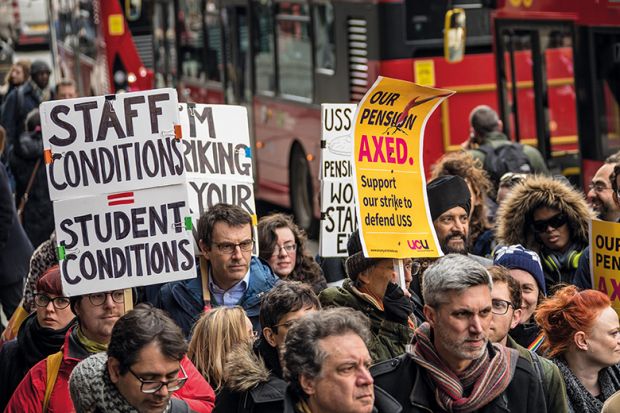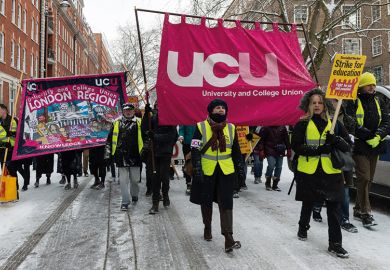The dust is now settling after the university pensions dispute in the UK. For many of us, this was an unprecedented event, a career-first altercation with our employer, unimaginable even a few years ago. Looking back, the upheaval was illuminating for a number of reasons.
Most conspicuous, of course, was the spirit of collective resolve between students, support staff and academics.
But the most surprising revelation – mentioned by the academics who I spoke with at least – was that university managers despised us so much. The conflict inadvertently functioned as a crucible, forcing senior elites – and their obedient army of technocrats – to reveal their true feelings about faculty: namely, one of contempt.
For sure, the hard line taken by vice-chancellors and human resources departments was so vitriolic that even seasoned union organisers were shocked: HR managers threated academics who missed classes, erroneously claiming that they could be personally sued by students. Union staff were told that they couldn’t use university email. One vice-chancellor even tried to plant “yes-men” in a town hall meeting to sway the debate.
Private sector managers who I’ve spoken to were also horrified by the tactics deployed by Universities UK officials. Bullying workers and treating them as disposable nuisances wasn’t “best practice” as far as they were concerned.
So why do university managers – particularly senior ones – now appear to despise academics? There are a number of explanations.
In an incisive and rather depressing exposé of life in US universities, Ron Strigley argues that a strange inversion has taken place. In the past, administrators were the ones held accountable while professors were virtually untouchable. Now, the tables have turned and university managers are enforcing their newfound authority with alacrity after years of playing second fiddle.
In UK universities it has burgeoned at an alarming rate, with non-academic personnel overpopulating many institutions. Management hierarchies have a number of peculiar characteristics that shed light on what is probably transpiring in the higher education sector.
First, they tend to proliferate. That’s because more managers are inevitably hired to supervise pre-existing managers and so on.
Second, research by Dacher Keltner at the University of California, Berkeley has demonstrated how bosses almost automatically display an “empathy deficit” towards subordinates, no matter how nice and compassionate they might otherwise be. Possessing power inevitably makes you more rude, distant and unfeeling to those beneath you.
And third, this growing swarm of managers soon discover that they need to justify their own existence. Many do so by creating “work” for others down the food chain, including pointless tick-box exercises and forms galore.
It is therefore no coincidence that with the rise of the “totally managed university” we also see an avalanche of internal metrics literally swamping faculty, including work-time surveys, student evaluations, grant targets, teaching excellence framework and research excellence framework performance indicators, and the rest.
But that’s only the start. In essence, quantification is motivated by distrust. The autonomy, professional discretion and judgement once thought crucial to the academic labour process is now looked on with deep scepticism by these new technocrats.
We all know that metrics are frequently useless (or worse) for capturing quality in a knowledge-intensive environment such as a university. But that’s beside the point. It’s about providing managers with a feeling of control and command over an “object” (ie, you and I). Spreadsheets are the weapon of choice.
Where does this insipid sense of distrust derive from? Herein lies the most disconcerting piece of the puzzle.
When I joined the UK university system 15 years ago, the old mentality was alive and well. Senior managers were also academics and there was an overarching sense of communal purpose: to educate and pursue cutting-edge research.
Today, things are dramatically different. Now most of us are employees hired by employers, who can do what they like since they “own” the business. End of story. Obedience is suddenly a fundamental requirement of being a good academic. Hence the pointless tsunami of metrics to check whether we are doing our jobs.
The claim that these Uber-management tactics are conducted to safeguard fee-paying students is clearly bogus. It’s tantamount to arguing that a world-class “learning experience” for students can be achieved only by driving lecturers into the ground.
Only in this milieu could the present “them v us” climate now define the contemporary university. What academics consider basic necessities for doing the job well – independence, self-management, collegiality and trust – is viewed by employers as both undeserving and a challenge to the new employment relationship.
There are many styles and philosophies of management. Unfortunately, UK universities have embraced an extreme neoliberal variant.
This management ideology maintains that it’s probably best not to have employment obligations in the first place. Better to keep any required workforce safely quarantined from the core institution via contracting, self-employment and other arrangements associated with Uberisation.
We can occupy and short-circuit this attempt to render academic labour invisible. Instead of striving to claim our rights as “employees”, we ought to draw on code that’s underscored universities for centuries. There are no employees since a truly public system is “owned” by all its members. An overseeing employer makes no sense in this sphere; worse still, it could even do damage.
Little wonder that they despise us.
Peter Fleming is professor of business and society at Cass Business School City, University of London.
Register to continue
Why register?
- Registration is free and only takes a moment
- Once registered, you can read 3 articles a month
- Sign up for our newsletter
Subscribe
Or subscribe for unlimited access to:
- Unlimited access to news, views, insights & reviews
- Digital editions
- Digital access to THE’s university and college rankings analysis
Already registered or a current subscriber?








